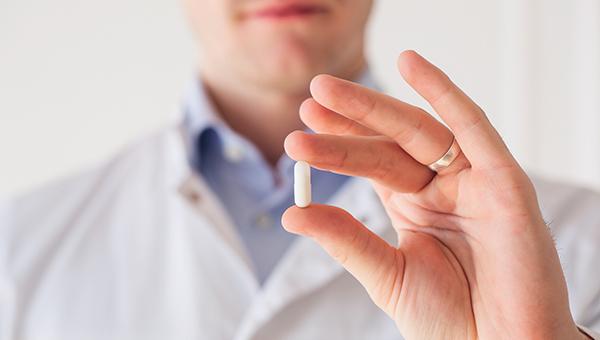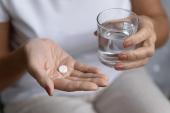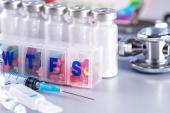Early Aspirin Tied to Less In-Hospital Mortality in Moderate COVID-19
The low-cost drug may make a big difference in countries that can’t afford more-expensive therapies, a researcher says.

Another study investigating aspirin in the setting of COVID-19 has investigators saying that the cheap, ubiquitous drug may have a role to play in countries where expensive therapies are scant, even as the hints of benefit seen in observational studies fail to gain strong support in randomized trials.
In this latest study, a large retrospective analysis, US adults with moderate COVID-19 who were given aspirin on the first day of hospitalization had a lower rate of 28-day in-hospital mortality compared with those who didn’t get aspirin (10.2% vs 11.8%), a difference that was significant after adjustment (OR 0.85; 95% CI 0.79-0.92), lead author Jonathan Chow, MD (George Washington University, Washington, DC), and colleagues report.
Early aspirin use also was associated with a lower rate of in-hospital acute pulmonary embolism (PE), but no difference in deep vein thrombosis (DVT). Bleeding rates were not statistically different between groups.
The study, published Thursday in JAMA Network Open, is consistent with other observational analyses suggesting a potential beneficial impact on mortality from using aspirin in the setting of COVID-19, which comes with a well-established thrombotic risk. Support from randomized studies is elusive, however. The RECOVERY trial showed that in hospitalized patients with COVID-19, aspirin didn’t reduce 28-day mortality and increased major bleeding compared with usual care alone. And REMAP-CAP, published earlier this week, demonstrated that the addition of aspirin or a P2Y12 inhibitor to prophylactic anticoagulation didn’t increase the number of organ support-free days—the primary endpoint—in critically ill patients with COVID-19, although there did appear to be a beneficial effect on in-hospital and 90-day survival.
The investigators of this new observational analysis acknowledge that their findings “warrant further study in a randomized clinical trial that includes diverse patients with cardiovascular comorbidities,” but Chow told TCTMD that “our study shows that aspirin can be used effectively in patients with moderate disease.” Differences in severity of disease and other patient characteristics could explain the discrepant findings when comparing the current results with the randomized trials, he indicated.
Throughout the pandemic, we’ve been trying to look at therapeutics that are widely available and inexpensive that can have wide applicability to everyone in the world, and I think aspirin fits those criteria. Jonathan Chow
Use of aspirin for patients with COVID-19 could be particularly important in lower income countries, he suggested. “Throughout the pandemic, we’ve been trying to look at therapeutics that are widely available and inexpensive that can have wide applicability to everyone in the world, and I think aspirin fits those criteria,” Chow said.
“These results are significant because not everyone in the world has access to expensive therapies such as monoclonal antibodies, remdesivir, or tocilizumab,” he continued. “And if aspirin can reduce mortality by 1.6%, which is what we found in our study, in this pandemic that has affected everyone in this world, that’s potentially a lot of lives that could be saved in all countries because of aspirin’s low cost and wide availability.”
Largest Retrospective Study
The current study—the largest retrospective analysis to tackle this issue, according to Chow—included 112,269 adult patients (median age 63) who were hospitalized with moderate COVID-19 through September 10, 2021, across 64 US health systems participating in the National Institute of Health’s National COVID Cohort Collaborative (N3C). Overall, 13.6% of patients received aspirin on the first day of admission, at a median dose of 81 mg and duration of 5 days. Of the patients in the no-aspirin group, 3.1% eventually received the drug after the first day of hospitalization (a median of 4 days to crossover).
Overall, the in-hospital mortality rate was 10.9%. The rate in the aspirin-treated group remained significantly lower than that in the no-aspirin group after adjustment for patient differences using inverse probability of treatment weighting. The largest differences in mortality were seen in patients older than 60 and in those with comorbidities.
Among the secondary outcomes, early aspirin use was associated with a lower rate of in-hospital acute PE (1.0% vs 1.4%; OR 0.71; 95% CI 0.56-0.90), but not acute DVT (1% in each group; OR 1.00; 95% CI 0.78-1.28).
Aspirin use did not confer a higher risk of various bleeding endpoints, including GI hemorrhage (0.8% vs 0.7%; OR 1.04; 95% CI 0.82-1.33), cerebral hemorrhage (0.6% vs 0.4%; OR 1.32; 95% CI 0.92-1.88), blood transfusion (2.7% vs 2.3%; OR 1.14; 95% CI 0.99-1.32), and composite hemorrhagic complications (3.7% vs 3.2%; OR 1.13; 95% CI 1.00-1.28).
Assessing the Totality of the Evidence
Asked to reconcile these findings with those of the randomized RECOVERY trial, Chow pointed to some key differences between the studies. The current analysis included slightly older patients (median age 63 vs 59) and those who were already taking aspirin before hospitalization—a group excluded from the RECOVERY trial. That resulted in patients with a heavier burden of comorbidities, including diabetes, CVD, and kidney disease, in the current study. “I think the populations of these two studies are pretty different, which is probably why we had different outcomes,” Chow said.
Jawahar Mehta, MD, PhD (University of Arkansas for Medical Sciences, Little Rock), who co-wrote an editorial discussing use of aspirin in COVID-19 published last year in Heart, pointed out, too, that although RECOVERY did not meet the primary mortality endpoint, it showed that aspirin-treated patients had a shorter duration of hospitalization and were more likely to be discharged alive within 28 days compared with the control group.
Combining that with the evidence from multiple observational studies, including a meta-analysis that he has been asked to review, “it appears that aspirin use may be protective in patients with COVID,” Mehta commented to TCTMD, acknowledging the limitations of retrospective studies.
He said it would be acceptable if physicians looked at the totality of evidence and decided to use aspirin in patients hospitalized with COVID-19, but urged caution. “Aspirin, even in small doses, is a drug and it should not be taken lightly. It does have side effects, like bleeding, that can be pretty serious and fatal in some people.”
Chow agreed: “A proper evaluation of the bleeding risk versus the potential benefit has to be done.”
Todd Neale is the Associate News Editor for TCTMD and a Senior Medical Journalist. He got his start in journalism at …
Read Full BioSources
Chow JH, Rahnavard A, Gomberg-Maitland M, et al. Association of early aspirin use with in-hospital mortality in patients with moderate COVID-19. JAMA Netw Open. 2022;e223890.
Disclosures
- The analyses described in this study were conducted with data or tools accessed through the National Center for Advancing Translational Sciences (NCATS) N3C Data Enclave and supported by a grant from the NCATS. The study was also partially supported by grants from the National Science Foundation and NIH/NCATS, as well as an award from the George Washington University Office of the Vice President for Research.
- Chow reports serving on the speakers bureau for La Jolla Pharmaceutical Company, unrelated to the current study.
- Mehta reports having served as a consultant to Bayer several years ago.





Comments